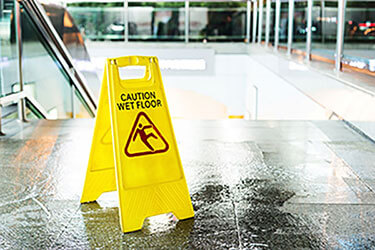


Slip and fall accidents can occur anywhere at any time.
Plaintiffs in slip and fall cases usually sue the owner of the property on which they suffered injury.
The Florida slip and fall statute requires a plaintiff to prove the elements of negligence to recover compensation.
A plaintiff must also file their case within a certain time frame known as the statute of limitations.
If you have been injured in a slip and fall accident in Florida, you should contact our slip & fall attorneys as soon as possible.
Give us a call at (850) 444-4878 or send us an online message today for a free consultation.
Pleading a successful negligence case requires proof of a duty, a breach of the duty, that the breach caused the accident, and that you suffered damages.
Slip and fall cases often occur in stores. In Florida, store owners must treat customers as invitees. Invitees are given the most protection under negligence law. Specifically, store owners must keep the property clear of any conditions that could cause injury.
However, the plaintiff must also prove that the store owner knew there was a dangerous condition on the property. An example of a dangerous condition is a liquid spill or a tripping hazard.
The plaintiff can prove knowledge by arguing that the store owner actually knew the dangerous condition was present. Alternatively, the plaintiff can prove knowledge by arguing that the store owner should have known the dangerous condition existed.
For example, the plaintiff could show that the condition had been there before or had been there long enough that it should have been found by an employee.
After establishing that a duty existed, the plaintiff must prove that the property owner’s conduct breached his or her duty of care.
Next, the plaintiff must prove that the defendant’s breach of duty actually and proximately caused his or her injury.
To prove actual cause, the plaintiff must prove that, but for the defendant’s breach of his or her duty of care, the plaintiff would not have slipped and fell.
Proof of proximate cause requires the plaintiff to show that his or her injuries were a foreseeable result of the defendant’s negligent conduct.
Finally, the plaintiff must establish that he or she suffered damages. Damages can take the form of both physical and emotional injuries. A common example of a physical injury is a broken arm or leg. Pain and suffering resulting from the injury is a common example of an emotional injury.
Furthermore, if the slip and fall accident aggravated pre-existing injuries, the plaintiff may be able to recover additional compensation for those injuries under the eggshell skull rule.
If you can establish a case under negligence law, you still must file it on time. A statute of limitations identifies a time frame during which you must file your case. If you don’t file your case within the statute of limitations, you can’t recover compensation.
The Florida statute of limitations for slip and fall cases is four years. This means that you have four years from the date of your accident to file your claim. A Florida personal injury lawyer can make sure you get your case filed on time.
During your slip and fall case, the property owner will probably argue comparative negligence in an attempt to reduce your recovery. Comparative negligence applies when you were partially at fault for causing your injury. Your percentage of fault reduces your amount of recovery.
Florida follows the pure comparative negligence rule. This means that you can still recover compensation no matter how high your percentage of fault. For example, if you suffered $10,000 in damages and were 70% at fault, you can still recover $3,000.
Some arguments the property owner might make include:
A personal injury attorney can help you overcome these arguments in court.
The Florida slip and fall injury lawyers at Emmanuel Sheppard & Condon can determine if you have a case. If you can establish a case, we will help you plead the four elements of negligence and file your case on time.
Additionally, we will strive to defeat the property owner’s comparative negligence arguments and fight to get you the compensation you deserve. Contact us online or call (850) 444-4878 today to schedule your free consultation.